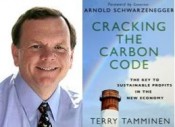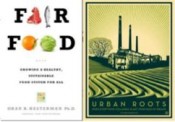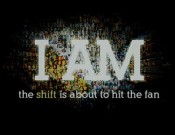Q&A: Terry Tamminen – Cracking the Carbon Code
Written on September 4th, 2012 |
Aired 09/02/12
When I first met TERRY TAMMINEN, he was living on a houseboat in the Marina and filling a position he’d founded as the first Santa Monica Baykeeper. No too long before that, he had been running a pool services company. And not too long after, he was Secretary of the California EPA.
Tamminen has reinvented himself successfully in several very different worlds — business, government, non-profit, foundation, from the grassroots to the halls of power. All of this for a long time now to achieve a sound and healthy relationship between society and the environment. He pursues that consistent vision with whatever works.
We’ll talk about the ideas in his book, CRACKING THE CARBON CODE: The Key to Sustainable Profits in the New Economy – which is very much a plan of action for companies who figure out that reducing carbon emissions reduces waste and is therefore good for the bottom line. He’ll tell stories of companies that have made or saved money by cutting carbon.
How has he been able to move things forward through politics and government in an era when so little seems to get done? Bottom line, are we moving fast enough? If not, how do we integrate all these different players to accelerate movement in the right direction?
http://seventhgenerationadvisors.org
Q&A: Oran Hesterman/Fair Food; Leila Conners/Urban Roots
Written on November 16th, 2011 |
Aired 11/13/11
Some bad news:
In 2008 more than 50% of all US harvested cropland grew only two crops – corn and soybeans and more than 40% of the food calories consumed worldwide came from just three crops: wheat, corn and rice.
30% of Detroit residents receive food stamps, but 92% of Detroit’s food stamp retailers offer few or no fresh fruit or vegetables.
The average plate of food eaten in our homes or restaurants travels 1,500 miles from where the food is grown. Our food system consumes 10.3 calories of fossil fuel energy to produce 1.4 calories of food energy.”
And some good news:
There are now 8000 farm to school programs across the US. Eight years ago there were only 4. There are now 6000 farmers’ markets in the US three times as many as in 1995. 330 hospitals in the US and Canada have pledged to purchase food that is grown according to Fair Food principles.
In recent years a number of books and films have documented the dangers of our current food system, and a number of those have been featured on Free forum. Just as you can’t alter the course of climate change by simply switching to efficient light bulbs, today’s guests believe that you can’t fix the broken food system by simply growing a backyard garden. It requires redesigning our food system.
My first guest, ORAN HESTERMAN has a new book FAIR FOOD, a guide to changing not only what we eat, but how our food is grown, packaged, delivered, marketed and sold. Hesterman opens the book talking about Detroit, Michigan, an unlikely beacon of hope in the fight for fair food.
Prior to starting the Fair Food Network, where he is President & CEO, ORAN HESTERMAN was the inaugural president of Fair Food Foundation, leading their sustainable food systems programs. Before that, he researched and taught in the crop and soil sciences department at Michigan State University in East Lansing, and for more than 15 years he co-led the Integrated Farming Systems and Food and Society Programs for the W.K. Kellogg Foundation, during which time the Foundation seeded the local food systems movement with over $200 million. FAIR FOOD is his first book.
My second guest LEILA CONNERS, a founder of Tree Media in Santa Monica, is a producer of URBAN ROOTS, a documentary on the food revolution taking place in Detroit. Directed by Detroit-native Mark McInnis the film tells the powerful story of a group of dedicated Detroiters working tirelessly to fulfill their vision for locally-grown, sustainably farmed food in a city where people — as in much of the county — have found themselves cut off from real food and limited to lifeless offerings of fast food chains, mini-marts, and grocery stores stocked with processed food from thousands of miles away.
LEILA CONNERS is Founder and President of Tree Media Group. Conners is director, producer, and writer on THE 11TH HOUR, as well as the short films “Global Warning” and “Water Planet” (all with Leonardo DiCaprio). She was Associate Editor at New Perspectives Quarterly and Global Viewpoint, focusing on international politics and social issues. She is producer of URBAN ROOTS.
fairfoodbook.org, fairfoodnetwork.org, urbanrootsamerica.com, treemedia.com
Q&A: TOM SHADYAC, Documentary Director – I AM
Written on March 16th, 2011 |
Aired 03/13/11
Also MARC IAN BARASCH, Author
My transition seems mild compared with that of today's guest, TOM SHADYAC. A onetime actor/comedian and the youngest writer to work for Bob Hope, Shadyac achieved huge Hollyood success -- writing, directing, and producing hits like ACE VENTURA, LIAR, LIAR, THE NUTTY PROFESSOR, and BRUCE ALMIGHTY, earning four People's Choice awards and a ton of money.
His new documentary, I AM recounts what happened after a cycling accident left him incapacitated for months. Though he recovered, the possibility that he might never be able to work or create again had changed him. He sold his estate, moved to a mobile home community (in Malibu), and set out to make a very different kind of movie.
With a four-person crew, Shadyac documented his journey to find answers to two questions. What's wrong with humans? What can we do to fix it?
Shadyac questions scientists, scholars, activists, poets -- David Suzuki, Noam Chomsky, Howard Zinn, Archbishop Desmond Tutu, Lynne McTaggart, Ray Anderson -- and Marc Ian Barasch, who joins the conversation in progress.
MARC IAN BARASCH is a writer, editor, television producer and environmental activist. In his book, The Compassionate Life: Walking the Path of Kindness, Barasch asks, "What if the great driving force of our evolution were actually "survival of the kindest?"
Are humans basically kind or basically cutthroat? Is compassion our birthright, or a hard won creation of culture? What exactly is compassion - that x-factor that every faith (or its founders, at least) exalts as a supreme virtue?
All proceeds derived from the release of I AM, in all media, will go to THE FOUNDATION FOR I AM, a not-for-profit established by Shadyac to fund various causes and to educate the next generation about the very issues and problems explored in the film.
Learn more at http://iamthedoc.com/ and http://www.compassionatelife.com/
